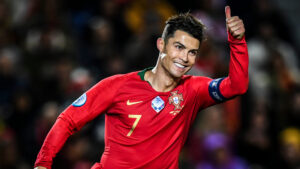Breaking a New Barrier
Cristiano Ronaldo has always been a record breaker, but his latest milestone is less about goals and more about wealth. At 40, the Portuguese icon has become football’s first billionaire, according to the Bloomberg Billionaires Index, with a net worth of $1.4 billion. This unprecedented figure comes after signing a two-year, $400 million contract extension with Saudi Arabia’s Al-Nassr, alongside long-term deals with Nike, Armani, and Castrol.
Ronaldo’s fortune marks a turning point in the economics of sport. It places him in the company of Tiger Woods, Michael Jordan, and LeBron James, athletes whose careers extended beyond arenas and pitches into the broader sphere of entertainment, branding, and global business.
The Saudi Deal: More Than a Contract
Ronaldo’s $200 million annual salary at Al-Nassr, free of taxation, has transformed him into a billionaire. For Saudi Arabia, the signing was about more than football. It was part of a cultural project: to rebrand the nation through sport, secure headlines across global media, and market the Saudi Pro League as a destination for talent.
For Ronaldo, the deal is pragmatic. European clubs were unwilling to match such an astronomical wage. In Riyadh, however, he found financial immortality—his name becoming synonymous not only with goals but with the geopolitics of modern football.
Career Earnings and Evolution
Ronaldo’s wealth was built step by step:
-
Manchester United (2003–2009): Salaries and bonuses established him among Europe’s elite.
-
Real Madrid (2009–2018): Peak years, where he reportedly earned $50–60 million annually. Shirt sales, bonuses, and sponsorships multiplied.
-
Juventus (2018–2021): A transfer that highlighted his commercial draw; within days, shirt revenues offset the transfer fee.
-
Return to Manchester United (2021–2022): Nostalgic but turbulent, setting the stage for his Saudi move.
-
Al-Nassr (2023–Present): His most lucrative chapter, cementing billionaire status.
In total, Ronaldo has earned around $550 million in career salary before Al-Nassr, supplemented by hundreds of millions in endorsements.
Endorsements and the CR7 Empire
Ronaldo’s billionaire crown rests on more than wages. His lifetime Nike contract, worth close to $200 million, places him alongside Michael Jordan and LeBron James. The CR7 line—boots, apparel, fragrances—extends his brand into consumer lifestyle markets.
Beyond Nike, Ronaldo has worked with Armani, Castrol, and Clear Shampoo, while also building his own businesses: the Pestana CR7 hotel chain, fitness centers, and wellness ventures. His vast Instagram following (over 620 million, the largest for any individual) guarantees unparalleled reach, making each sponsored post worth millions.
Messi in Comparison
Inevitably, Ronaldo’s billionaire milestone brings Lionel Messi into the conversation. Messi has earned more in pre-tax salaries—around $600 million—but Ronaldo’s strategy of tax-advantaged earnings and diversified endorsements pushed him over the threshold first.
Messi’s current deal with Inter Miami is more forward-looking: it includes revenue-sharing agreements with Apple TV and equity in the club after retirement. This structure may ensure Messi joins Ronaldo in the billionaire ranks within the next few years, albeit through a slower accumulation model tied to ownership.
Image, Influence, and Digital Capital
Ronaldo is not just a footballer—he is a cultural phenomenon. His fitness routines, goal celebrations, and the viral “Siuuu” chant have transcended sport. He embodies the fusion of athlete and influencer, using social media as a stage that operates beyond the 90 minutes of football.
This digital clout has become as valuable as his right foot. His audience provides brands with instant access to a global fan base, giving Ronaldo leverage few athletes—or even celebrities—can match.
Symbolism of Being First
To be the first billionaire footballer is to redefine the boundaries of sporting wealth. Golfers, boxers, and basketball players reached the mark through pay-per-view models or U.S. sports economics. Ronaldo’s journey, by contrast, unfolded within football’s collective structure of clubs, leagues, and sponsors.
His billionaire status also signals a power shift: traditional European clubs are no longer the center of financial gravity. Instead, Gulf states, U.S. investors, and digital platforms are reshaping football’s economics. Ronaldo’s story is a case study in this transformation.
Impression
Though still active, Ronaldo is preparing for life beyond the pitch. His business empire already includes hotels and gyms, and expansion into digital media, streaming content, or even football ownership seems inevitable. Philanthropy is another area where he could leverage his wealth, having already supported hospitals and children’s charities.
Unlike previous generations of players, Ronaldo will not need punditry, coaching, or nostalgia tours to maintain relevance. His billionaire status ensures his brand can outlive his playing career.
No comments yet.









